Michael Douglas bets a benjamin on 'Franklin' TV series: How actor turned Founding Father
LOS ANGELES – Even Michael Douglas had doubts about portraying Benjamin Franklin in the Oscar-winning actor's first period drama.
Douglas, 79, who famously proclaimed "Greed is Good" in his iconic 1987 "Wall Street" role, just had to glance at Franklin's ubiquitous portrait on the $100 bill to see there wasn't much resemblance to the Founding Father.
"There was a lot of hesitancy from top to bottom. I'd take a look at a $100 bill and I was like, 'Hmm, I don't know,'" Douglas says of the role.
So he leaned into Michael Douglas – from the hair to the laugh and the signature gravelly voice – to play the 18th-century giant, who lived from 1706-1790. "As well as people have known me over so many years, that persona was needed to lead this story through," says Douglas.
Here's how Douglas pulled off "Franklin" (streaming Fridays on AppleTV+), based on Stacy Schiff’s 2005 historical novel “A Great Improvisation: Franklin, France, And The Birth of America."
Michael Douglas on playing Ben Franklin‘I wanted to see how I looked in tights’
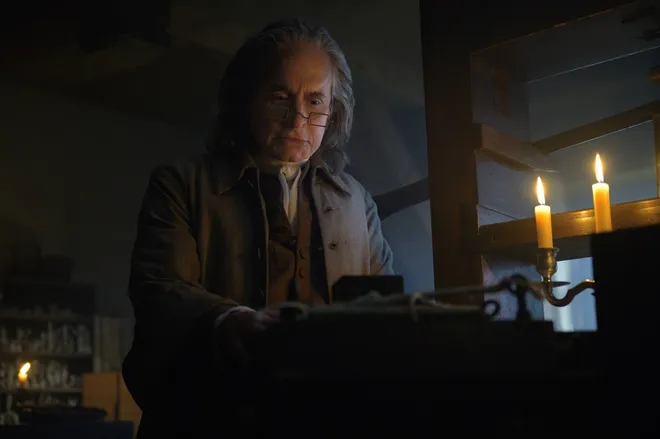
Why is Benjamin Franklin in France during 'Franklin'?
The 18th-century intellectual giant, most recently the subject of a 2022 Ken Burns documentary, is famous for helping Thomas Jefferson draft the Declaration of Independence, his lightning storm experiments on electricity and as the publisher whose wise sayings were chronicled in his annual Poor Richard's Almanack.
Yet Douglas was surprised to learn the critical role Franklin, who was 70 in 1776, played in secretly courting crucial French assistance for the floundering American Revolution against the two countries' mutual rival, England.
"I thought back to my high school history classes, and this crucial chapter of Franklin going to France wasn't even spoken of," says Douglas, who believes the series highlights the still-fragile state of American democracy. "We were in trouble in America and Franklin was the last hope. He improvised and because he was so smart, pulled it off."
Franklin, with his teenage grandson Temple (Noah Jupe), navigates British spies and the French court in the series shot throughout France, including at the famed Palace of Versailles.
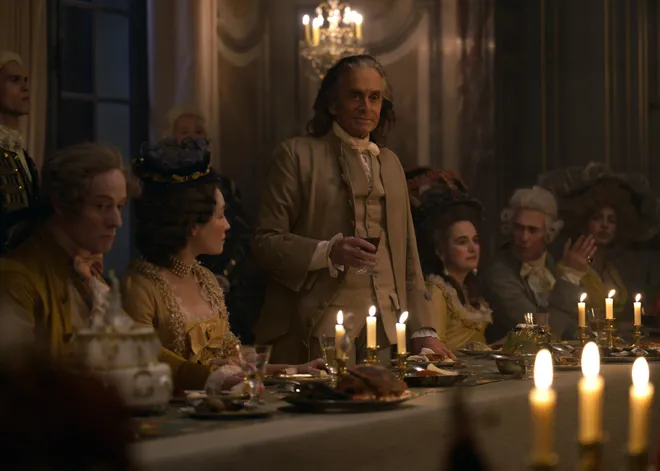
Douglas brought the real long hair, bad French
Douglas has shown his transformational powers with his Emmy-winning performance as Liberace in 2013's HBO project "Behind the Candelabra."
But the actor decided to forgo the arduous daily makeup and prosthetics to become Franklin, which would have added physical changes such as the bald forehead, as well as heavier neck and body seen in portraits.
"It would have been 2 1/2 hours of makeup and then 40 minutes to take it off. That's a big part of your shooting day sitting in the chair," says Douglas. "When you're talking 160 shooting days, it made me nervous."
Douglas earned Franklin's likeness naturally by growing out his hair. The wilder look led to tabloid headlines but went down just fine with his wife of 23 years, actress Catherine Zeta-Jones.
"Catherine loves me any way she can get me," says Douglas. "And I had long hair in the '60s when I was a hippie. So it saved me from wearing a wig."
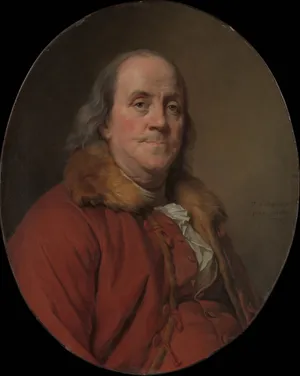
He donned the period outfit, embracing the tights, the custom-made shoes, the famed Franklin spectacles, and the marten fur hat that was the talk of France at the time. Voila! Ben Franklin by way of Michael Douglas.
"Within minutes of the series you're all in with him," insists director Tim Van Patten.
Same deal with Franklin's accent, which does not deviate much from the famous actor's distinctive voice. Even Douglas' poor French worked since written history shows Franklin also struggled with the language.
"I speak a little bit of French and thought I was pretty good until I saw the series," says Douglas. "I realized I was as bad as every American tourist in France."
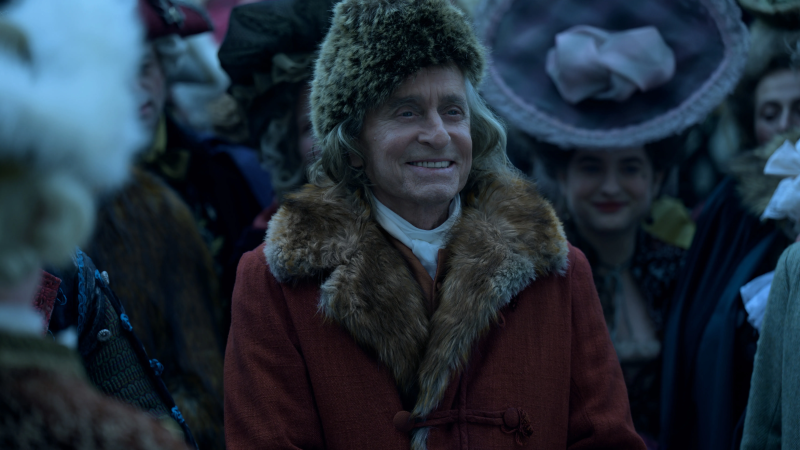
Douglas insisted on the Franklin proud farting scenes
There are moments of joyous Founding Father flatulence in "Franklin."
"I have to take responsibility for that. I just thought he should fart a couple of times," says Douglas. "I mean he's in his 70s, he's not well, and passing wind can be funny."
It's also historically accurate and relevant since Franklin trumpeted the joys of tooting in France. In the 1781 satirical essay "Fart Proudly," Franklin proclaimed the joys of "discharging freely the wind from (the) Bowels" seven times a day.
"I read the fart essay and thought it was fabulous," says Douglas, who pushed to have it included. "At first they were like, 'Nah!' But I said, read this, it's one of the joys of life."
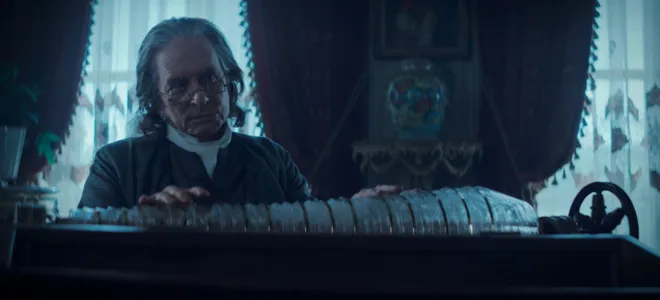
Franklin invented the glass armonica, Douglas never mastered it
Douglas was also impressed to learn that Franklin invented an instrument that makes music through water-filled glass bottles, the glass armonica.
"He had all the tricks, bells and whistles to make himself a universal man," says Douglas. The actor plays the instrument in "Franklin," but never mastered it. "I was able to get sounds out of it, but let's just say that scene was recorded," says Douglas.
Douglas eventually got used to seeing himself as Franklin, especially during a scene where the French celebrity is feted at a gallery filled with paintings and statutes of his likeness. "I laughed my ass off when I walked into that room filled with portraits," says Douglas. "I had to keep at least one of them. So I took one of the more over-the-top paintings."
He confesses the framed Douglas-Franklin watercolor is not yet in the New York home he shares with Zeta-Jones.
"It's in storage," says Douglas. "We haven't quite found the proper place to hang it up."
Disclaimer: The copyright of this article belongs to the original author. Reposting this article is solely for the purpose of information dissemination and does not constitute any investment advice. If there is any infringement, please contact us immediately. We will make corrections or deletions as necessary. Thank you.







